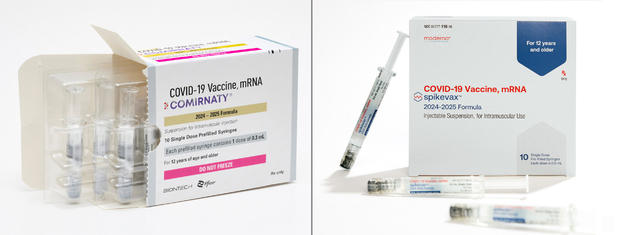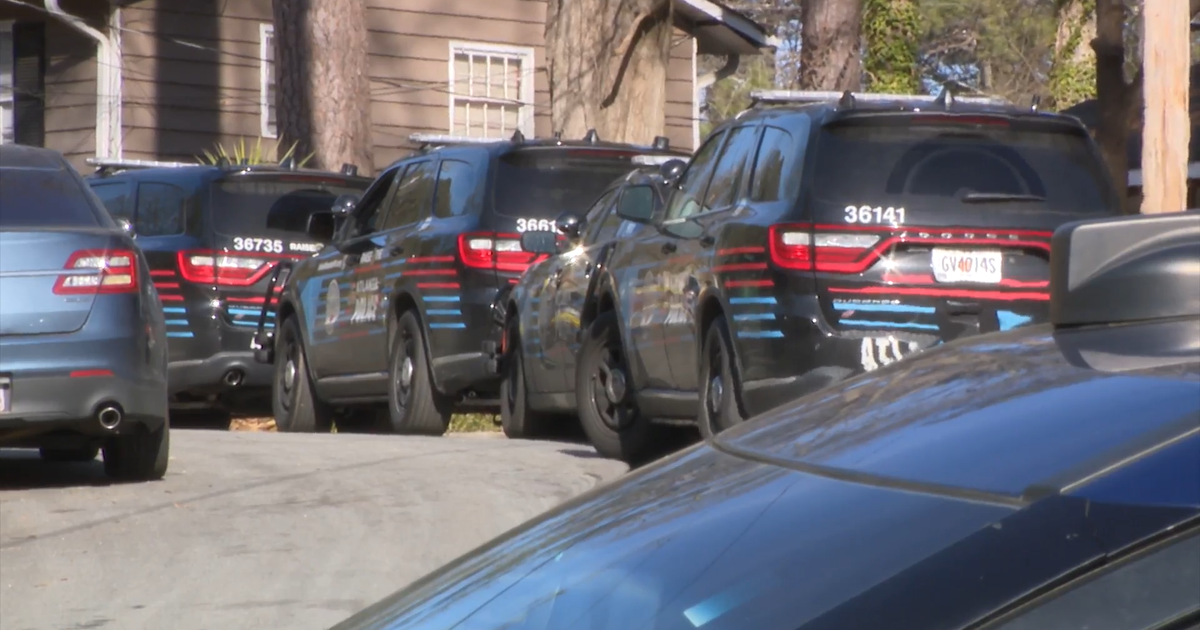FDA OK's new COVID vaccine shots for fall 2024 from Pfizer and Moderna
The Food and Drug Administration announced Thursday it has greenlighted updated COVID-19 vaccines from Pfizer and Moderna for the 2024 fall season. The decision clears the way for distribution to begin for the latest version of the shots earlier this year than last year.
Moderna and Pfizer's shots were revised this year to target the KP.2 variant of SARS-CoV-2, the virus that causes COVID-19, as part of a now-annual process undertaken by the FDA and health authorities around the world to update the vaccines to protect against newer strains of the virus.
"Given waning immunity of the population from previous exposure to the virus and from prior vaccination, we strongly encourage those who are eligible to consider receiving an updated COVID-19 vaccine to provide better protection against currently circulating variants," said Dr. Peter Marks, Director of the FDA's Center for Biologics Evaluation and Research.
Similar to previous seasons, the Centers for Disease Control and Prevention is recommending that all Americans ages 6 months and older get a shot of the "updated 2024-2025 COVID-19 vaccine" to protect against another expected surge of the virus this fall and winter.
In a presentation to the American Medical Association earlier this month, CDC Director Dr. Mandy Cohen recommended starting to administer COVID-19 shots this year as soon they are available.
"Then the administration should continue through September, October, November, those are the months you really want to be paying attention to," she said.
Both Moderna and Pfizer say they expect the first shots from their vaccines to become available in the coming days around the country. Another updated vaccine from Novavax is also expected to get the FDA's authorization this year.
"FDA has committed to moving swiftly on regulatory authorization. We expect to have authorization in time for peak vaccination season," Novavax said in a statement.
Why are updated COVID-19 vaccines rolling out now?
Since this past winter, health authorities have been working to accelerate this year's rollout of COVID-19 vaccines.
Last year's late-September rollout of the shots led to a number of fumbles that likely depressed vaccination rates, CDC officials said in February, like confusing messaging and struggles for patients to access the shots.
Instead, COVID-19 vaccines this year will become available around the same time that deliveries of flu shots are arriving in clinics. That is the result of an earlier CDC vote to recommend the shots over the summer and an earlier FDA selection of the strain to be targeted by the shots, moving it closer to the annual process to update the seasonal flu vaccine.
For most people, the CDC recommends getting a flu shot in September or October each year, which can be given at the same time as the COVID-19 vaccines.
"If you have someone in front of you, and the option is, this is my chance to give them vaccines, co-administration is a best practice. So we encourage it," the CDC's Dr. Demetre Daskalakis said at the AMA event.
Health officials have long acknowledged that the rollout of this year's new COVID-19 vaccines would likely arrive too late for many Americans infected by this summer's wave of the virus.
"It's very difficult to try to time COVID vaccine before an oncoming surge. And so I think what we're left with is trying to time it with the respiratory virus season, and think about uptake at the same time as folks are getting their flu vaccines," the CDC's Dr. Ruth Link-Gelles told a panel of the FDA's advisers in June.
Why do the shots target the KP.2 variant?
The new shots from Moderna and Pfizer target the KP.2 variant, which is a descendant of the JN.1 strain that drove part of last winter's surge of infections.
This decision to target KP.2 is different from what the World Health Organization and some other countries had recommended, calling for shots aimed at the JN.1 variant.
Pfizer and Moderna presented early data on shots targeted at KP.2 as well as JN.1 to a panel of the FDA's outside vaccine advisers in June, as the companies prepared to ramp up production.
While the FDA's advisers called for the agency to target JN.1, the agency cited the "recent rise in" cases to reject the committee's advice and aim the shots at KP.2 instead in order to "more closely match" the latest strains.
But KP.2 has been declining as a share of infections for months. Another strain called KP.3.1.1 has rapidly grown amid this summer's wave. More than a third of cases are now from KP.3.1.1, the CDC estimates.
While the difference between the strains might have some impact on how effective the shots are this fall and winter, scientists have said the gap between these different variants is still relatively small compared to previous jumps in the virus.
"All of these viruses that are circulating currently, even though they have very different names are very, very similar to each other. So it is just a nomenclature issue, why you have these different sounding names," the CDC's Natalie Thornburg said Monday, in a call with testing labs.




